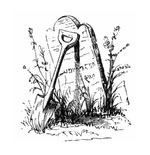
A Requiem for Old Rosy
REVERT'S ROSTRUM
The night of December 30, 1862, the Union Army of the Cumberland and the Confederate Army of Tennessee bivouacked a little over a third of a mile apart outside Murfreesboro, Tennessee. During the evening, the bands of the two respective armies playfully competed with each other, one side performing “Yankee Doodle” and provoking a hearty response of “Dixie.” When one band started playing “Home! Sweet Home!” the other joined in. Soon, thousands of Yankees and Rebels were singing in chorus.
The camaraderie was short lived. At dawn the next morning, ten thousand Confederates struck the right flank of the Army of the Cumberland, surprising thousands of Union soldiers who had yet to finish breakfast. Within a few hours, the Union division on that right flank had been devastated, suffering over 50 percent casualties. By 10 A.M., the division had been driven back three miles to the Nashville & Chattanooga Railroad and the Nashville Pike.
The commander of the Army of the Cumberland, Maj. Gen. William Starke Rosecrans, canceled his planned assault on the Confederate right, rushing reinforcements to steady his own collapsing right flank. As Rosecrans sped across the battlefield directing his units, his uniform was splattered by the blood of his friend and chief of staff, Col. Julius Garesché, who was beheaded by a cannonball. Thankfully for Rosecrans, one of his subordinate officers, Brig. Gen. Philip Sheridan, had anticipated an early Confederate attack and ordered his division up at 4 A.M. Sheridan’s men repulsed three separate Rebel charges in a cedar forest soon nicknamed “The Slaughter Pen.”
Though the Confederate Army of Tennessee suffered 9,000 casualties that day, its commander, Gen. Braxton Bragg, was convinced of a Rebel victory. (Unbeknownst to Bragg, so were many of Rosecrans’s own senior staff!) Before retreating to bed, Bragg relayed a telegram to the Confederate government in Richmond: “The enemy has yielded his strong position and is falling back. We occupy [the] whole field and shall follow him…. God has granted us a happy New Year.”
You May Also Enjoy
If only a Catholic could run as a Catholic and be elected as a Catholic (and not deny his Catholicism as John Kennedy did in 1960), then Al Smith might stand redeemed.
As always, when contemplating the political order, we should keep in mind the psalmist’s exhortation: “Put not your trust in princes.”
Newspapers, confined to messages in black and white, often think in black and white and do not perceive true, profound traditionalism.

